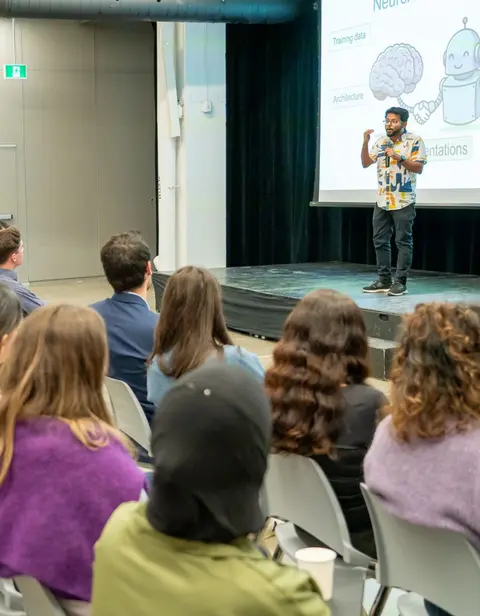Speed Science Contest
A science communication training program to help AI scientists better explain their research to non-specialists.
A science communication training program to help AI scientists better explain their research to non-specialists.
Scientists can benefit from popularization skills to share their knowledge with society at large, yet traditional academic careers offer limited opportunities to hone these skills. To bridge this gap, Mila has created a science communication contest to help Master's and PhD students in AI be better science communicators, inspired by the Ma thèse en 180 secondes / Three Minute Thesis initiatives.

Over the course of several weeks, Mila researchers develop their science communication and storytelling skills in a professional training and mentorship program. Through workshops and feedback sessions, participants learn to craft compelling three-minute presentations about their research. The program culminates in a public grand finale where a jury of non-specialists selects the top three presentations, and the audience gets the chance to choose a crowd favourite.

In an era of misinformation, the role of scientists is to provide the real facts and present them to the public. The competition was a wonderful opportunity to learn how to make a good presentation and how to tell a great story.
The contest is held every year in the spring and in the fall.
The next edition will take place in the fall of 2025 at Mila.
For any questions about the program, contact communications@mila.quebec.

This program highlighted the importance of clear and responsible communication, particularly when engaging with the public about AI advancements. It also encouraged me to prioritize accuracy and avoid contributing to unnecessary hype, while also presenting complex ideas in an accessible way.
Discover the full presentation of each participant during the spring edition of the Speed Science contest.
Kusha Sareen, Master’s student at McGill University, won the first prize for his presentation “Teaching AI to Check Its Own Math”.
Amar Kumar, PhD student at McGill University, won the second prize for his presentation “From Algorithm to Clinic: Explainable AI for Trustworthy Diagnosis”.
Rashid Mushkani, PhD Student at Université de Montréal, won the third prize for his presentation “Locked Out by Design”.
Michael Przystupa, Research Intern at Université de Montréal, won the audience choice award for his presentation “From Math to Mobility: Empowering People Through Smarter Control”.
Carol Altimas, Master’s student at Université de Montréal: Becoming a Tree Detective.
Benno Krojer, PhD student at McGil University : From a soup of raw pixels to abstract meaning.

“What I liked most about the program is the cooperation among the students during the preparation stage, where my colleagues provided me with feedback to improve my presentation, and vice versa. It brought me more confidence in my public speaking and communication skills.”